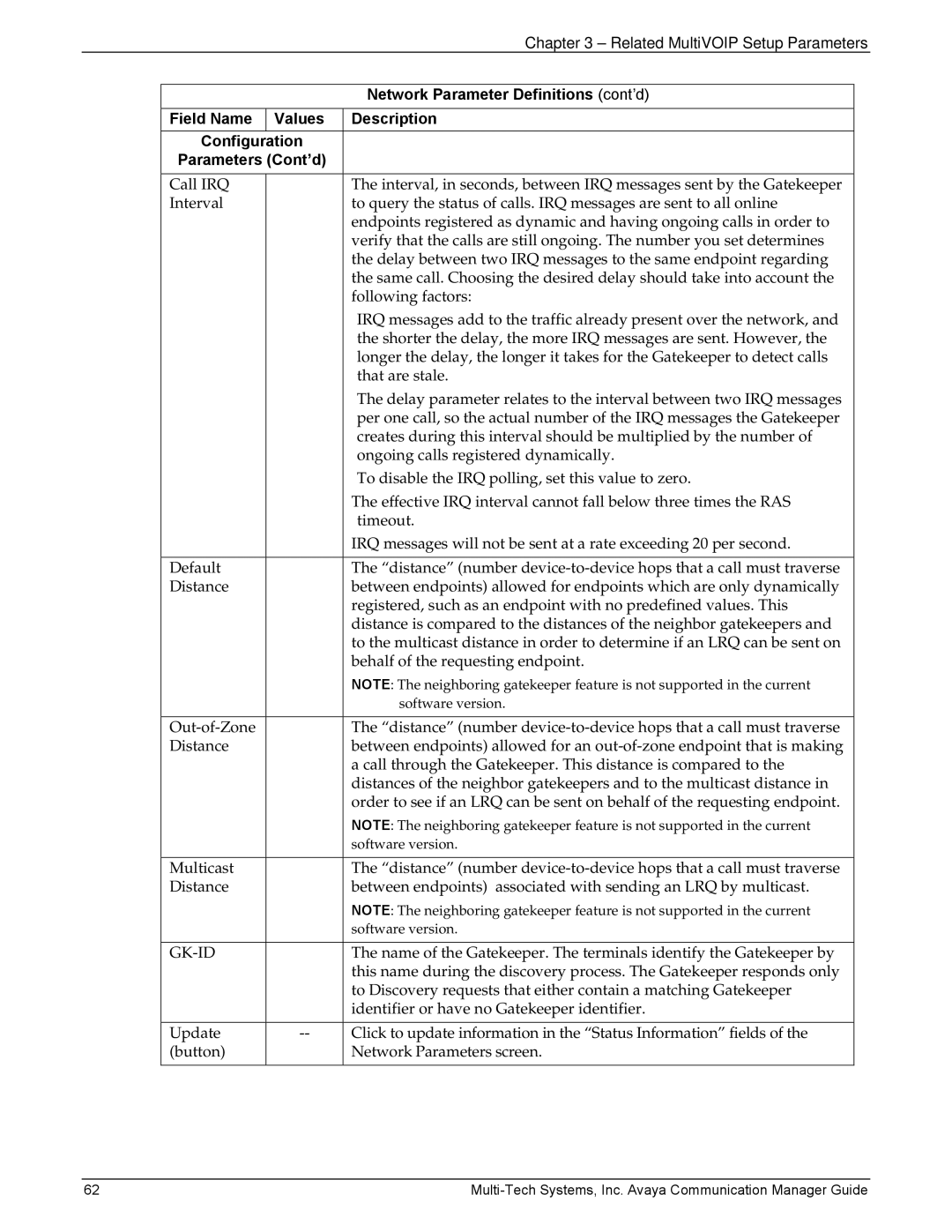|
|
| Chapter 3 – Related MultiVOIP Setup Parameters | |
|
|
|
|
|
|
|
| Network Parameter Definitions (cont’d) |
|
|
|
|
|
|
| Field Name | Values | Description |
|
| Configuration |
|
| |
| Parameters (Cont’d) |
|
| |
| Call IRQ |
| The interval, in seconds, between IRQ messages sent by the Gatekeeper |
|
| Interval |
| to query the status of calls. IRQ messages are sent to all online |
|
|
|
| endpoints registered as dynamic and having ongoing calls in order to |
|
|
|
| verify that the calls are still ongoing. The number you set determines |
|
|
|
| the delay between two IRQ messages to the same endpoint regarding |
|
|
|
| the same call. Choosing the desired delay should take into account the |
|
|
|
| following factors: |
|
|
|
| IRQ messages add to the traffic already present over the network, and |
|
|
|
| the shorter the delay, the more IRQ messages are sent. However, the |
|
|
|
| longer the delay, the longer it takes for the Gatekeeper to detect calls |
|
|
|
| that are stale. |
|
|
|
| The delay parameter relates to the interval between two IRQ messages |
|
|
|
| per one call, so the actual number of the IRQ messages the Gatekeeper |
|
|
|
| creates during this interval should be multiplied by the number of |
|
|
|
| ongoing calls registered dynamically. |
|
|
|
| To disable the IRQ polling, set this value to zero. |
|
|
|
| The effective IRQ interval cannot fall below three times the RAS |
|
|
|
| timeout. |
|
|
|
| IRQ messages will not be sent at a rate exceeding 20 per second. |
|
|
|
|
|
|
| Default |
| The “distance” (number |
|
| Distance |
| between endpoints) allowed for endpoints which are only dynamically |
|
|
|
| registered, such as an endpoint with no predefined values. This |
|
|
|
| distance is compared to the distances of the neighbor gatekeepers and |
|
|
|
| to the multicast distance in order to determine if an LRQ can be sent on |
|
|
|
| behalf of the requesting endpoint. |
|
|
|
| NOTE: The neighboring gatekeeper feature is not supported in the current |
|
|
|
| software version. |
|
|
|
|
|
|
|
| The “distance” (number |
| |
| Distance |
| between endpoints) allowed for an |
|
|
|
| a call through the Gatekeeper. This distance is compared to the |
|
|
|
| distances of the neighbor gatekeepers and to the multicast distance in |
|
|
|
| order to see if an LRQ can be sent on behalf of the requesting endpoint. |
|
|
|
| NOTE: The neighboring gatekeeper feature is not supported in the current |
|
|
|
| software version. |
|
|
|
|
|
|
| Multicast |
| The “distance” (number |
|
| Distance |
| between endpoints) associated with sending an LRQ by multicast. |
|
|
|
| NOTE: The neighboring gatekeeper feature is not supported in the current |
|
|
|
| software version. |
|
|
|
|
|
|
|
|
| The name of the Gatekeeper. The terminals identify the Gatekeeper by |
|
|
|
| this name during the discovery process. The Gatekeeper responds only |
|
|
|
| to Discovery requests that either contain a matching Gatekeeper |
|
|
|
| identifier or have no Gatekeeper identifier. |
|
|
|
|
|
|
| Update | Click to update information in the “Status Information” fields of the |
| |
| (button) |
| Network Parameters screen. |
|
|
|
|
|
|
62 |
